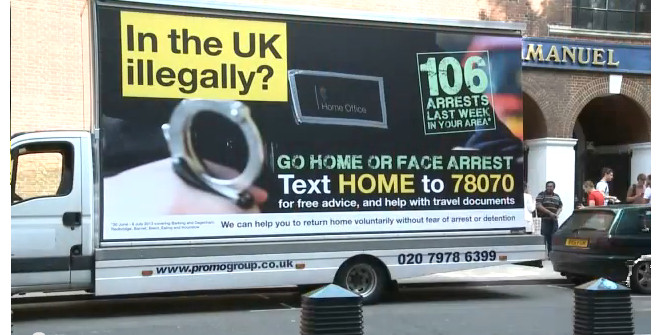The government’s ‘hostile environment’ policy failed to increase the number of people voluntarily leaving the UK, while increasing destitution and nurturing racism. According to London-based think tank the Institute for Public Policy Research (IPPR) the policy has led to poverty, facilitated discrimination against minority ethnic groups, risks public health and safety, and erroneously affected those with legal status.
Theresa May declared in an interview with the Daily Telegraph in May 2012 that she wanted to create a ‘really hostile environment’ for irregular migrants in the UK. That ‘hostile environment’ found political expression through a shopping list of measures limiting access to work, housing, healthcare, bank accounts and more introduced through the Immigration Act 2014 and the Immigration Act 2016.
The IPPR report, Access Denied: the Human Impact of the Hostile Environment, calls for a fundamental reform of current policies as the hostile environment ‘does not appear to be working for anyone: for migrants, for the Home Office, or for the wider public’. Discovering ‘little evidence’ the ‘hostile environment’ approach to immigration enforcement is meeting its primary purpose: to force those without immigration status to leave the UK without immigration officials’ involvement. Home Office administrative data showed voluntary returns have fallen considerably since 2014, when some key hostile environment measures were introduced.
Employers, landlords, and frontline workers have been made to implement these measures so immigration officials do not have to be directly involved. The report criticises this ‘transfer of responsibilities away from immigration officials and towards untrained professionals’ and the damage to workplace relations.
‘The hostile environment is a policy based on ideology, not evidence,’ commented lead author Amreen Qureshi. ‘Our report finds that it has forced people into destitution without encouraging them to leave the UK, highlighting both its poisonous impacts and its ineffectiveness. It doesn’t work for the Home Office, it doesn’t work for people without immigration status, and it doesn’t work for our society. Yet this policy continues to be implemented at the cost of human rights, human dignity and human life. Deep reform is called for, and this should start at the Home Office.’
‘Hostile environment’ has no set definition, but generally refers to the immigration enforcement measures introduced to reduce people in the UK without immigration status by making their lives as difficult as possible and removing access to essentials, such as work, free healthcare, and housing. As a research participant from Bolivia said: ‘They make you think that you prefer to be dead in your own country than alive here’.
The report reveals undocumented migrant families, unable to access public funds, are often malnourished and in substandard, cramped accommodation. As finding employment is essential to avoid destitution and offer financial security, the increased ‘right to work’ checks have driven statusless migrants into the shadow economy. This leads to increased vulnerability, especially for women.
The line between policing and immigration enforcement has blurred. ‘Operation Nexus’ has embedded immigration officers in police stations, allowing them to conduct immigration checks on those arrested who are deemed potential foreign nationals.
In 2018, a Freedom of Information Request showed 27 of the UK’s 45 police forces shared information on victims and witnesses of crime with Immigration Enforcement (here). The report shows this data sharing between the police and Home Office deters victims and witnesses of crime from coming forward. A quarter of 50 migrant women surveyed, all who survived domestic abuse, said deportation fears deterred them coming forward. Two-thirds had their abusive partner use deportation as a threat to silence them reporting the abuse. IPPR concluded this reticence impedes police efforts against serious crime, posing a risk to public safety.
The hostile environment has left many without immigration status feeling unable to seek treatment; the report details individuals being denied necessary care as they were unable to pay upfront. The Coronavirus pandemic has exacerbated these issues. In April, the charity Kanlungan told the Independent that a cleaner from the Philippines died of Covid-19 because of fears of being treated without having immigration status. (here). The report documents how lack of clarity prevents immigrants without status coming forward, even though treatment for Covid-19 is free.
In January 2018 the Home Affairs committee admitted people with a lawful right to be in the UK are ‘caught up in the system’ (here). Up to 57,000 people from Commonwealth countries are likely to have been affected. Most notably the Windrush generation were granted residency rights under the British Nationality Act 1948. But, with no documentation to prove their status, the hostile environment meant many lost their jobs, became homeless, and were prevented from accessing free healthcare. The Home Office has apologised for their failures; yet the latest figures from March 2020 show around 700 claims to the Windrush Scheme were unresolved due to complexity and more than 1,000 have yet to be considered. (here).
Since the Windrush Scandal, reports within the Home Office reveal low morale and confusion over the hostile environment’s objectives. The Home Affairs Committee was ‘concerned that the policy is unclear and, in some instances, too open to interpretation and inadvertent error’ (here). The report highlights how the ‘hostile environment’ policy erroneously affects people with the legal right to work in the UK, and creates a ‘climate of suspicion for “foreign looking” people’. The IPPR’s analysis of data from the Home Office found in 2019, from 1 July to the 30 September, 72% of Immigration Enforcement visits were to restaurants and takeaways. David Bold, the chief immigration inspector said these raids were largely triggered by allegations from members of the public and as specific nationalities were ‘believed to be removable’.
The report finds the hostile environment built barriers for ‘the most vulnerable individuals’. A survey conducted by the charity Joint Council for the Welfare of Immigrants (JCWI) found landlords are reluctant to conduct online checks, necessary for groups whose circumstances grant them ‘permission to rent’ from the Home Office. This includes asylum seekers and victims of trafficking and modern slavery.
The JCWI has challenged the ‘Right to Rent’ in court. Both the High Court and Court of Appeal agreed the scheme causes racial discrimination. But, on appeal, the Court of Appeal’s judges did not declare the scheme unlawful, deferring judgement to the Government and MPs to decide if the racial discrimination caused is ‘greater than Parliament envisaged when enacting the provisions’ (here).
Following the Wendy Williams’ Lessons Learned review of the Windrush Scandal the government is evaluating the hostile environment. Home Secretary Priti Patel called for ‘sweeping reforms’ to Home Office systems and practices after accepting the review’s 30 recommendations. However, the report notes, despite renaming the hostile environment to ‘compliant environment’, the underlying principles and core elements remain.







